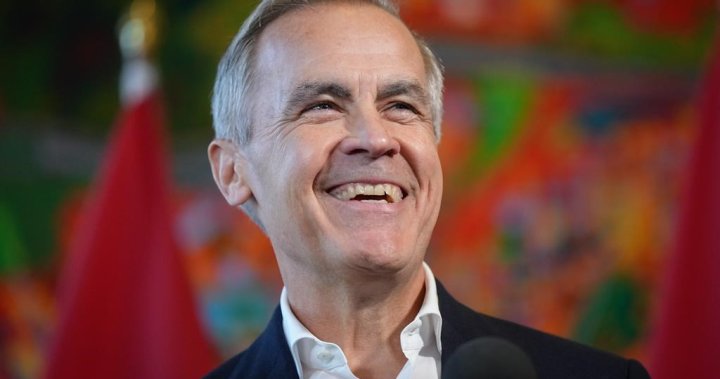Mark Carney announced his bid to lead the Liberal Party of Canada Thursday, promising a change from “politics as usual” to rebuild the economy in a way that works better for average Canadians.
“I’m here to ask for your support. I’m here to earn your trust to lead that fight,” Carney told a crowd of supporters in Edmonton.
“I’m back home in Edmonton to declare my candidacy for leader of the Liberal Party and prime minister of Canada.”
The former central banker and economist is the highest-profile candidate so far in the race to replace Prime Minister Justin Trudeau, who announced he intends to resign earlier this month.
Carney said his past experience leading the Bank of Canada and the Bank of England is proof of his economic bonafides, which he said will be his primary focus if he becomes prime minister.
Carney, who has advised Trudeau’s government on the economy, said the prime minister and his government had “let their attention wander from the economy too often.”
“The system is not working as it should, and it’s not working as it could,” he said. He pointed to stagnant wages and high taxes for the middle class, and an imbalance between government spending and investment.
Those problems would still exist without U.S. president-elect Donald Trump’s threat of tariffs on Canadian goods, he added, but warned they will do further damage.
“I am going to be completely focused on getting our economy back on track.”

Carney said he’s propose “some big changes and some bold new ideas” in the coming weeks to address those economic issues. He vowed the Liberals “are going to win the (next) general election” despite the party’s months-long polling slump under Trudeau.
If he wins the leadership, Carney would still be able to serve as prime minister despite not holding elected office. He did not say Thursday where he intends to run in the next election, but political experts predict he will seek an Edmonton-area riding.

Get breaking National news
For news impacting Canada and around the world, sign up for breaking news alerts delivered directly to you when they happen.
Born in Fort Smith, N.W.T., and raised in Edmonton, Carney earned an undergraduate economics degree from Harvard University and followed that up with master’s and doctoral degrees from Oxford University.
Most Canadians were first introduced to Carney as the governor of the Bank of Canada. He was appointed by Conservative Prime Minister Stephen Harper and replaced David Dodge in the role in 2008 — right before the global financial crisis.
Carney received widespread acclaim for steering Canadian monetary policy and the wider economy through the financial firestorm. That performance led him to take on the same role at the Bank of England from 2013 to 2020, becoming the first non-Brit to lead the institution.
“I’ve helped save two economies,” Carney said Thursday. “I know how business works and I know how to make it work for you.”
While much of his career has been in the private sector and central banking, Carney did have a three-year stint in Canada’s Department of Finance, serving as senior associate deputy minister during the tenures of two finance ministers: Liberal Ralph Goodale and Conservative Jim Flaherty.
Last year, Trudeau tapped Carney as chair of a Liberal Party task force advising the party leader on economic growth.

Carney’s potential plunge into politics has been rumoured since the summer, when Trudeau acknowledged that he has been speaking with Carney “for years about getting him to join federal politics.”
Carney teased his bid for the Liberal leadership in an interview on The Daily Show on Monday, where he painted himself as “an outsider” who can address the economy.
The Conservative Party has escalated its attacks on Carney and his ties to the Trudeau government in recent weeks as Carney’s name rose to the top of the list of potential Liberal leadership candidates.
A new ad released by the party Thursday ahead of Carney’s announcement zeroed in on Carney’s support for carbon pricing and said he’s “Just Like Justin.”
“Carbon Tax Carney is the furthest thing possible from an outsider,” the Conservatives said in a statement alongside the ad.
Speaking to reporters in Delta, B.C., earlier Thursday, Conservative Leader Pierre Poilievre brought up Carney’s name several times when referring to the Liberals and reiterated his call for an election.
Carney on Thursday called out Poilievre for prioritizing “soundbites” that “won’t solve problems.”
“Conservatives don’t run around saying ‘Canada’s broken’ because they want to fix it,” Carney said. “They want a license to demolish and destroy.
“In these times, sending Pierre Poilievre to negotiate with Donald Trump is the worst possible idea.”

Whoever wins the Liberal leadership race on March 9 will have just a couple of weeks to introduce themselves to Canadians as their new prime minister and turn the Liberals’ fortunes around before Parliament is set to return on March 24.
Opposition parties are expected to force a non-confidence vote at the earliest opportunity, which would trigger an election.
The latest Ipsos poll for Global News, released earlier this month after Trudeau’s resignation, showed just 20 per cent of Canadians support the Liberals, compared to a whopping 46 per cent of decided voters backing the Conservatives.
Ipsos also found that 17 per cent of Canadians reported a positive impression of Carney, with the same number saying they’d vote for the Liberals if he was leader.
Former deputy prime minister Chrystia Freeland and current Government House Leader Karina Gould are expected to announce their leadership campaigns this week.
Current Ontario Liberal MP Chandra Arya and former Montreal MP and businessman Frank Baylis have announced they are running.
Nova Scotia MP Jaime Battiste and Energy and Resources Minister Jonathan Wilkinson have said they are also contemplating a run. Battiste would be the first Indigenous prime minister were he to run and win the leadership.
—With files from Global’s Uday Rana
© 2025 Global News, a division of Corus Entertainment Inc.





